On March 5th a debate was held in the Grand Committee Room next to Westminster Hall concerning the “Performance of South West Water”.
You can read the transcript of the entire session in Hansard if so desired. Alternatively you can watch a recording of the entire session.
The debate was opened by Simon Jupp MP as follows:
I beg to move,
That this House has considered the performance of South West Water.
It is a pleasure to serve under your chairship, Mr Henderson. I am delighted to have secured this important debate, one year on from another debate that I secured on the performance of South West Water. It is another opportunity to hold South West Water to the highest possible standards in the House.
Last year, I described the performance of our water company and its historic lack of investment as “shameful”, and many of my constituents shared my point of view. This year, I want to focus my speech on the facts facing my constituency of East Devon. The public want to see evidence of improvement and delivery of the promised investment, and they want South West Water to clean up its act and our water. South West Water must deliver better services for our constituents, improve our bathing waters, and protect our natural environment. Not doing so puts the vibrancy of our coastal communities under threat.
More on all that later. However, we’re going to start our discussion with the speech given by the Member of Parliament for North Devon, Selaine Saxby. Here is a recording of her presentation:
Ms. Saxby’s opening remarks were as follows:
It is a pleasure to serve under your chairmanship, Mr Henderson. I thank my hon. Friend the Member for East Devon (Simon Jupp) for securing today’s important debate.
I must declare an interest: I surf. I surfed on Sunday on a beach that South West Water’s website advised it was safe to surf on and had been for 24 hours. However, a well-known campaign group assured me that it had a sewage alert on it. This happens week after week. A campaign group has chosen to misrepresent the data it has, issuing sewage alerts when the combined storm overflows run and scaring people from entering our beautiful waters. Yes, we would all like the combined storm overflows to not run so often, but they are over 95% rainwater, and on most of North Devon’s stunning surf beaches they rush out into the Atlantic ocean. It does not take 48 hours for the tide to sort that out. The recommended gold standard for removing overflow waters is one tidal rotation, which is 12.5 hours.
I must declare an interest too. I’m older than Selaine, so these days I merely bodyboard. As our regular reader(s) will have no doubt noticed, that means I take a great deal of interest interest in weather forecasting, surf forecasting, sewage pollution forecasting, and post hoc analysis of the veracity of said forecasts. All of which means that I already have several bones to pick with her, with several more to follow. I do of course agree that it would be very nice if South West Water’s CSOs ran less often. However I cannot help but wonder what evidence Selaine has for her confident assertion that “The recommended gold standard for removing overflow waters is one tidal rotation, which is 12.5 hours.”?
I don’t know if Ms. Saxby reads academic papers about water quality forecasting and testing, but I do. Only last week I published an article entitled “A Critical Review of Bathing Water Quality Forecasts“. Here is a brief extract from a University of Reading press release:
With coastal and wild swimming becoming more popular, local authorities urgently need to make use of improved forecasting techniques to identify the dangers from bugs such as E. coli or intestinal enterococci, which can be lethal, the researchers said…
“We expect beaches that are designated for swimming to be clean and safe, but authorities often don’t have good enough information to issue warnings, leaving swimmers and surfers more vulnerable to getting ill. The way we manage our sewage and land means rivers and seas are frequently polluted, and heavier summer downpours due to climate change is making the problem worse at the time of year when people are most likely to be at the beach.”
Here is a heavily referenced extract from the academic journal paper mentioned in that press release:
Combined sewer overflows (CSOs) provide an outlet for flows that exceed the hydraulic capacity of combined sewerage systems, on which much of the UK’s sewer infrastructure relies(Al Aukidy & Verlicchi,2017; Botturi et al.,2021). During heavy rainfall events a mixture of stormwater and raw sewage is directly discharged into receiving watercourses causing deterioration of water quality (Poopipattana et al.,2021). Additionally, water companies dump untreated or partially treated sewage in rivers on a regular basis, often breaching the terms of permits that allow such practices only in exceptional circumstances, including storm overflows at wastewater treatment works due to heavy rainfall, emergency overflows due to equipment failure, and CSOs elsewhere on the network (Gardiner et al.,2022).
Hence here is my first question for Selaine Saxby – “Have you read Gardiner et al.,2022 yet?”
That is the UK Parliament’s Environmental Audit Committee report on water quality in rivers. Here is an extract:
The Event Duration Monitors (EDMs) currently installed on the network record the time and duration of each discharge, but do not record the volume or the pollutant load. Dr Rob Collins of the Rivers Trust explained why this was significant: “We know nothing about pollution levels in CSOs. It is all very well monitoring their duration and the flow but, if you think about it, they combine raw sewage with what runs off the urban environment. That is a huge chemical cocktail: faecal microbes, hydrocarbons, industrial chemicals, plastics, pharmaceuticals, personal care products will be found in those flows. We know something about their impact on the aquatic environment but we know very little about their impact upon human health if you ingest a big mouthful or two of that.”
My second question is “Do you have a reference for the ‘gold standard for removing overflow waters’ that you mentioned?”
Which brings me to my third question. “Where did you go surfing last Sunday Selaine?”
Ms. Saxby’s statement to Parliament implies that it certainly wasn’t at Woolacombe! This screenshot is from the morning of March 3rd:
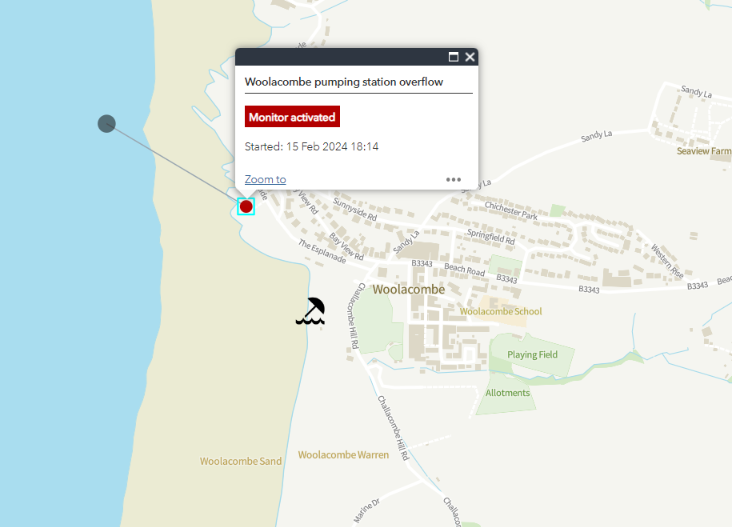
Perhaps it was a bit further south? Selaine had this to say about Croyde Bay in her concluding remarks:
South West Water has more to do. I want to know how that incident at Ashford and two more incidents at Croyde over Christmas happened. Most of all, however, I want people to have easy access to accurate information about when it is safe to enter the water on some of the finest beaches in the world.
All of which suggests another question, albeit more for the Environment Agency and/or South West Water rather than Selaine Saxby:
“Were any water quality tests performed at Woolacombe between February 15th and March 3rd 2024? If so, what did the results reveal?”
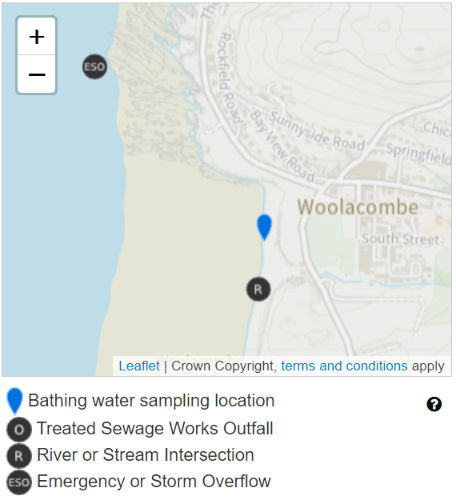
Since she is active on XTwitter I posed my questions to Selaine Saxby over there yesterday. I haven’t heard back from her yet. Rest assured that you will be the first to hear when (if?) she does. Here is another extract from her speech in the Grand Committee Room last week:
We are a hardy bunch in North Devon. We are out all year round.
With that in mind, I want to focus on the serious problem that occurred in North Devon just three weeks ago, when there was a raw sewage spill from a sewage treatment works due to an electrical fault caused by a contractor on site. This resulted in six hours of raw sewage running into a large river that runs straight out to sea. Yes, there are questions for South West Water about the incident, but accidents do happen. South West Water reported it in line with all procedures.
The Environment Agency recommended closing four beaches and posted details of the sewage incident on its website. Unfortunately, it informed only one of the two councils that needed to be notified. No one told people on the beaches. The well-known campaign group, which we would think would rush to issue a sewage alert, did nothing of the sort. Its “sewage alert” has no definition; it literally means that the storm overflow had gone at some point in the previous 48 hours. The group chooses not to use the information that is available to it from the Environment Agency, which details when there is a real sewage pollution issue. In that respect, I have an issue with the South West Water website as well, which only includes data on its own storm overflows. However, it is at least clear that that is what the company is doing.
Most people do not use the Environment Agency website, which is not a fancy app that says when there is a problem. On that day, although we now know that sewage was being released, the campaign group that apparently prides itself on supporting surfers did not use the data available to it and surfing lessons went ahead.
By way of illustration of the “problem” as she apparently sees it, here is a hot off the press illustration from Widemouth Bay in North Cornwall. This is an annotated version of South West Water’s WaterFit Live map this morning, with our local big beach break highlighted:
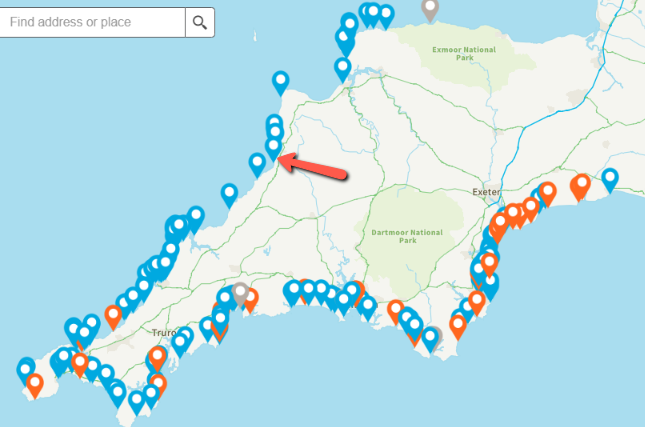
Here is the equivalent map from the Surfers Against Sewage “Sewage Pollution Alerts” web page:
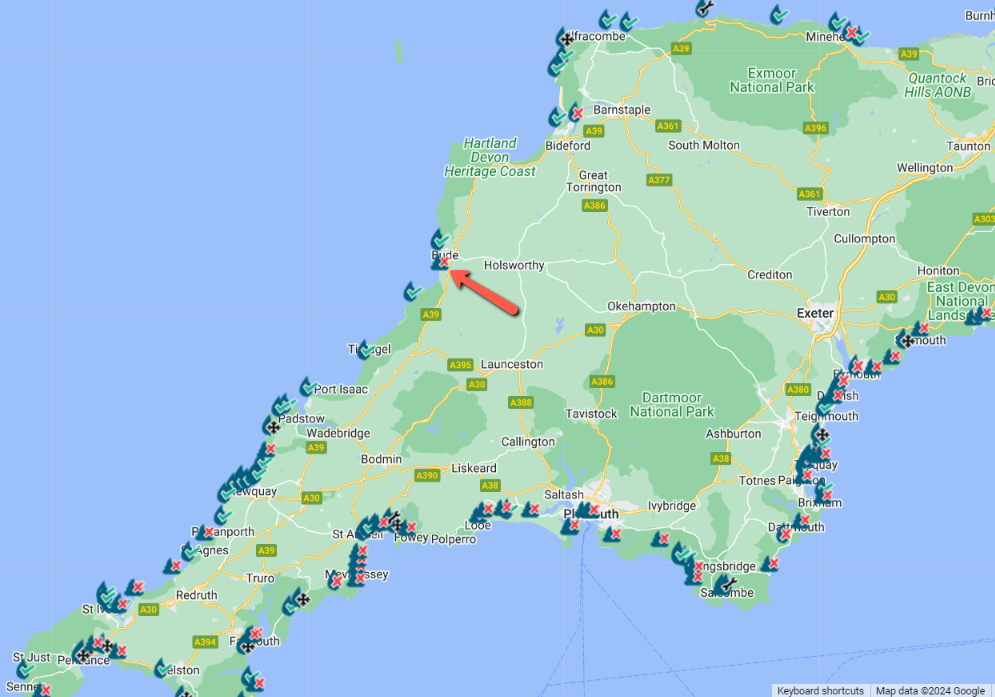
Here too is what you see if you click on the pushpin representing Widemouth Sand on the WaterFit Live front page:
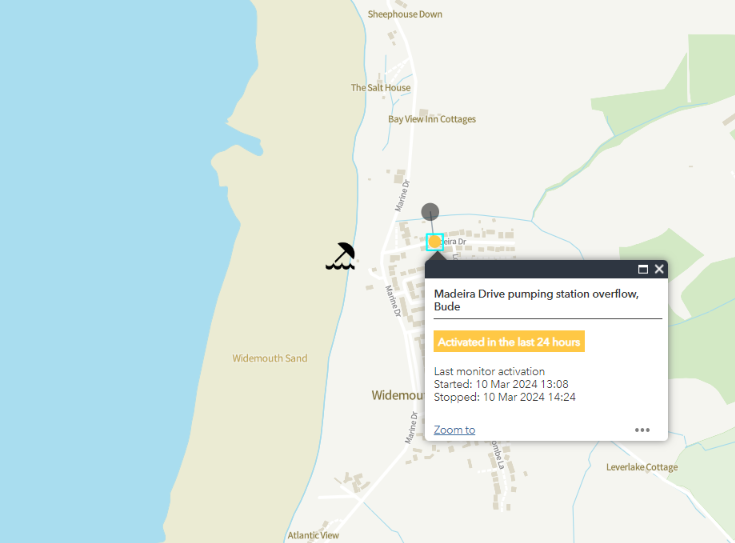
Here’s another thing Selaine said in Westminster last week:
Many people who regularly use the beaches in North Devon gave up on the campaign app some time ago. One surf school said, “We’d never go surfing if we listened to them.”
Hence here is my fourth question for Ms. Saxby: “Is it safe for surf schools to operate at Widemouth this morning? Was it safe for for surf schools to operate at Woolacombe on the morning of March 3rd, when you went surfing somewhere else?”
[Update – March 12th]Heading over to the coast of South Devon, here is Simon Jupp’s introduction to the debate:
Following his opening remarks Simon went on to say:
[Update – March 13th]As the MP for East Devon, I am determined to push South West Water to deliver the standards expected by local residents, visitors and businesses. I want the unacceptable pollution we have seen in Exmouth, Sidmouth and Budleigh Salterton to be met with the full force of the law. Thanks to this Conservative Government, we finally have the tools to hold South West Water to account. It is the biggest crackdown on sewage spills in history: the Government have introduced unlimited fines, accelerated investment plans, legal targets to reduce discharges from every single storm overflow and eliminate all ecological harm, as well as compulsory storm overflow monitors, and they have forced live spill data to be made public. I voted for all that. The Government have passed a suite of new laws to crack down on spills, including the Environment Act 2021, the Environmental Targets (Water) (England) Regulations 2022, the Environmental Civil Sanctions (England) (Amendment) Order 2023, and the Environmental Permitting (England and Wales) (Amendment) (England) Regulations 2023.
Those new laws, brought in by this Conservative Government—and no previous Government—are forcing the hand of water companies, but new laws on their own will not clean up our water: more investment, better data, and tougher enforcement are clearly needed. On investment, we know that South West Water has historically failed to invest; we pay the highest sewerage bills in the country, and we have not had our fair return for decades. On data, we now know the scale of the problem, because this Government lifted the lid on the water companies’ infrastructure and made them pay to monitor the results of their own failures.
Labour’s Luke Pollard, the MP for Plymouth Sutton and Devonport, was the next to be called on to speak by chair Graham Henderson:
Amongst other things Luke had this to say:
Raw sewage is the perfect metaphor for the last 14 years. For years, South West Water dished out huge dividends to its shareholders while dumping sewage into our rivers and seas. Our region deserves so much better than that. The most recent data from the Environment Agency has not been published for 2023, but the 2022 figures show there were more than 37,000 sewage spills in the south-west. In Plymouth alone, there were more than 2,000—an average of five spills every day, or 12,750 hours of sewage dumping. According to South West Water’s live, interactive storm overflow map, as of half-past 3 today there are 26 bathing water locations across Devon and Cornwall that may be affected by the operation of overflows, including two in Plymouth. Having more data is a necessary part of being able to respond to the challenges of a lack of investment in infrastructure over a long time. However, that data must lead to enforcement and to a change in investment behaviour by South West Water in order to start shutting down those storm overflows for routine discharge.
This is the “WaterFit Live” map that he was referring to, albeit recorded at 18:54 the same evening:
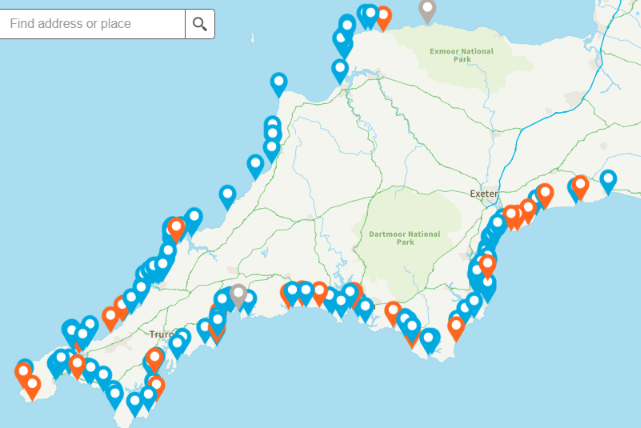
If Luke had clicked on the orange pushpin representing Plymouth Hoe East he would have seen something like this, recorded on March 8th:
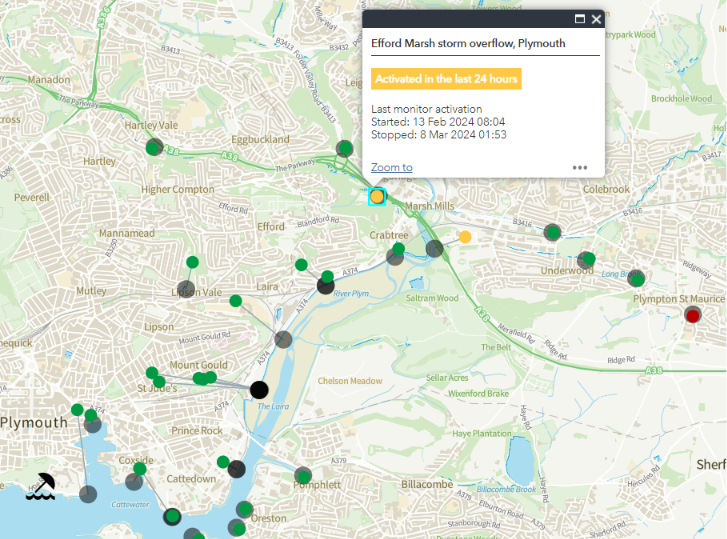
Here is the same map this morning:
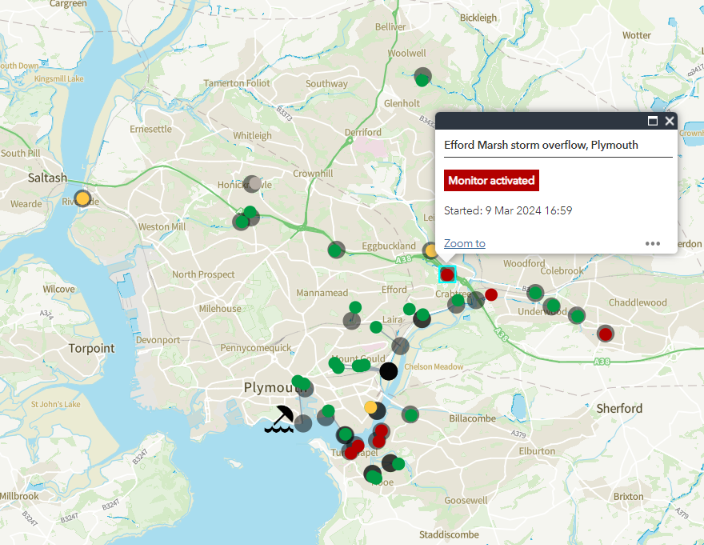
Next to speak was Anne Marie Morris, the Conservative MP for Newton Abbot. By way of a change, she addresses the issue of water supply rather than waste water:
[Update – March 15th]The Environment Agency predicts that England risks running short of water by 2045—not very far away—due to climate change and population growth. The Government are struggling to get our daily usage down to 122 litres per person by 2050—currently that figure is 145 litres. We have built no new reservoirs since 1991, and we know that the Environment Agency is going to reduce river abstractions.
In 2022 we had one of the hottest summers on record, and yes, we did almost run out of water. What happened in the south-west? Reservoirs were at a record low — Roadford lake was 30% below its usual water level—and, much to everyone’s consternation, hosepipe bans were implemented for over a year, from August 2022 to September 2023.
The Environment Agency was not impressed; as a result of a Freedom of Information Act request, a leaked email from the Environment Agency said that South West Water“were not honest, open and transparent with regulators about their drought projections”
and that there was
“a lack of understanding of their own supply system”.
Basically, it was not prepared.
Next came Richard Foord, the Liberal Democrat MP for Tiverton and Honiton. He started by referring to the strange phenomena of “staggering dividends” accompanied by “dry spills”:
[Update – March 16th]“It is good that we are talking about the performance of a single water company, and South West Water is plainly one of the worst performing water companies in the country, but we should not focus myopically on the performance of one single water company and miss the big picture: the regulatory environment in which all water companies work. That is what I shall address my remarks to. It is true that South West Water pays out some staggering dividend payments. Since 1990, South West Water has paid out in dividends an amount equivalent to £2,931 per property. That is more than any of the other 13 English water companies. A constituent of mine from Seaton recently pointed out to me that South West Water, or its parent company Pennon Group, owes £3.1 billion, which is similar to the amount paid in dividends since 1990, which is £3.2 billion. By those measures, South West Water is a poorly performing water company, but we have to look at the environment in which it is working. The water companies are working to the incentives that their shareholders set for them, rather than for the public benefit and good.
There were 146 recorded dry spills over a 12-month period last year. To recap, those are illegal spills made by water companies when there is no heavy rainfall. Just yesterday evening, I was talking to Jo Bateman from the East Devon constituency, who attended the End Sewage Pollution coalition meeting that I brought together. She explained to me that she is suing South West Water for those illegal dry spills. I am not at all persuaded that water companies will simply do the right thing without Government intervention. We know the Environment Agency has been denuded of resources in recent years. The agency had £235 million cut from its budget when the right hon. Member for South West Norfolk (Elizabeth Truss) was the Secretary of State for Environment, Food and Rural Affairs.”
Graham Henderson then called Kevin Foster, the Conservative MP for Torbay, to address the assembled throng:
Amongst other things Kevin had this to say:
[Update – March 18th]The Tor Bay Harbour Authority needs to stop using the same term for both rainfall drainage predictions and actual sewage releases—an issue which the previous Lib Dem-independent coalition-run council and the current Conservative leadership have raised regularly with the Environment Agency. The aim is to create clarity for residents, ensure that investment is targeted at sewage and end any misleading presentations of data by third parties. I look forward to the Minister’s response, and I ask that he cover some specific points. First, what work will be done to hold South West Water to the commitments it has made to invest in further improvements in water quality?
Secondly, alongside the wider plans for our region, how will local communities be able to hold South West Water and other partners, such as local councils, to pledges such as the ones recently made relating to Goodrington and Paignton sands? Finally, what steps will he take with the Environment Agency to create greater clarity about what is rainwater draining from land and what is an actual sewage spill? The aim is to bring clarity for the public and focus for resource investment.
Progress has been made, but there is more to do. We need to keep a focus on the issue and ensure that our water company is held to account, so that the progress residents expect to see is delivered.
Kevin was swiftly followed by Toby Perkins, Labour’s Shadow Minister for Nature and Rural Affairs and MP for Chesterfield:
In part, Toby had this to say:
The recent report by the Rivers Trust, “State of Our Rivers”, which was published only last week, shows that the dial overall has not shifted on the health of our waterways. Not a single English river is in good overall health, and that has not changed since the previous report in 2021. A multitude of factors inform water health, but 54% of rich river stretches failed because of activities attributed to the water industry. That simply is not good enough.
Yesterday, along with the hon. Member for Tiverton and Honiton, I spoke at the launch of the election manifesto for the Surfers Against Sewage campaign. It was a shame that the Government were not able to send the Minister, although he was intending to go. It is an important coalition, because the issue is of huge importance to our constituents, particularly to the economy of the south-west. As the hon. Member for Tiverton and Honiton reflected, we heard from Jo Bateman about the powerful campaign that she is fighting for the ability to swim in clean waterways, recognised as an amenity that should be available to us all.
In preparing for this debate, I was pleased to hear about the work of Jayne Kirkham and Perran Moon, Labour’s parliamentary candidates for Truro and Falmouth and for Camborne and Redruth, respectively. They have supported protests and started petitions that add to the community fight to preserve Cornwall’s waterways. Jayne stressed that the discharges into Cornwall’s rivers was impacting on tourism and costing millions alongside the environmental damage.
Toby asked Minister for Water and Rural Affairs, Robbie Moore:
[Update – March 19th]Many people are concerned that Ofwat’s new growth duty will further reduce its ability to be a force for environmental good. When the Minister responds, I hope that he can set out how he sees that duty working alongside Ofwat’s responsibilities to improve environmental outcomes. Does the Minister agree that the perception that our waterways are not fit to swim in is damaging to growth as it depletes tourist revenue? If so, will he confirm whether he has instructed Ofwat that its new growth duty must mean that no sewage discharge is liable to reduce tourist growth?
The final speech of the debate came from the Parliamentary Under-Secretary in the Department for Environment, Food and Rural Affairs, Robbie Moore:
He didn’t answer Toby Perkins’ question, but he did say:
Recently, I undertook a tour of the south-west and heard at first hand how pollution can impact coastal communities and local economies. I want it to be clear that this Government have made improving water company performance a top priority. While performance may have improved in the 2022-23 reporting year, South West Water remains one of the worst performing companies, with a long way to go still—in particular on pollution incidents and storm overflow discharges, both of which were significantly above the industry average in 2022. That is completely unacceptable. South West Water should be under no illusion: it must take urgent steps to reduce its pollution incidents significantly, as well as addressing other performance concerns, such as increasing resilience of the water supply.
Among the concerns expressed by Members, my hon. Friend the Member for East Devon raised the issue of sewage discharge into Exmouth bathing water. I have recently had discussions with him about that, and he has written to me several times. Although the condition of the bathing water is currently classified as excellent by the Environment Agency, I wish to reassure the House that the recent incidents raised by my hon. Friend are currently being investigated by the Environment Agency. It has required South West Water to provide data and information to support its investigations. It would be inappropriate for me to comment from the Dispatch Box while this investigation is ongoing, but please rest assured that the regulator will not hesitate to hold the water company to account if a breach has occurred.
The Environment Agency is also scrutinising South West Water’s overall pollution reduction plan to ensure that the company has the right plans in place to prevent future issues. I will also be personally seeking assurance from the chief executive of South West Water, Susan Davy, that the company is doing all it can to mitigate the environmental impacts and protect bathing waters both in Exmouth and across the south-west for the sake of both the environment and public health.
I am also aware of the concerns of Members and the public following high-profile sewage spills, such as those at Harlyn Bay in Cornwall. I am pleased to see that South West Water has outlined an £800,000 investment in this area by 2025 to reduce surface water ingress into the combined sewer network to help reduce storm overflow spill frequencies. However, its actions are again coming too late, following years of neglecting its civic duties. This Government will not be shy of holding the company to account.
To be continued…